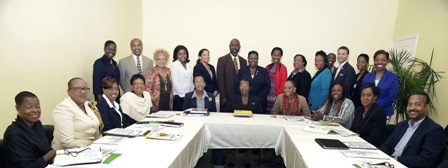UN Officials Assist Implementation of Strategic Plan on Gender-Based Violence
| Authored by: | Matt Maura |
| Source: | Bahamas Information Services |
| Date: | April 7, 2016 |

| Stakeholders participating in the multi-sectoral consultation on the National Strategic Implementation Plan on Gender-based Violence in The Bahamas began day one of their two-day consultative process Thursday, April 7, 2016 at the Training Room, Ministry of Social Services and Community Development. Officials from UNWomen are also participating in the Consultations to help guide the process towards implementation. Minister of Social Services & Community Development Melanie Griffin is pictured standing, centre. (BIS Photo/Derek Smith) |
NASSAU, The Bahamas – Representatives of UN Women — the United Nations’ Entity for Gender Equality and the Empowerment of Women – and those from local public and private gender equity organizations in New Providence began a series of multi-sectoral consultations on the Bahamas’ National Strategic Plan on Gender-based Violence Thursday at the Training Room, Ministry of Social Services and Community Development.
The consultations are taking place less than eight weeks after a Report conducted by the National Task Force on Gender-based Violence in The Bahamas was presented to Prime Minister, the Rt. Hon. Perry Gladstone Christie on February 15, 2016. The Report was tabled in Parliament on February 24, 2016.
The consultations, along with the Implementation Plan, are expected to provide a multi-level, inter-agency, mechanism to eradicate gender-based violence in the Commonwealth of The Bahamas.
Officials from UNWomen attending the training session include Tonni Brodber, Deputy Representative for the Caribbean; Gabrielle Henderson, Programme Specialist; and Dr. Icilda Humes, Regional Consultant. The group is expected to “help guide local officials through the final stages of the Implementation Plan.”
Minister of Social Services and Community Development, the Hon. Melanie Sharon Griffin, said the goal of the Strategic Plan to address gender-based violence and the Implementation Plan is the eradication of gender-based violence within the Commonwealth of The Bahamas through the full implementation of a coordinated, multi-level and multi-sectoral response that promotes inter-agency cooperation and participation of all citizens.
“Eradicating gender-based violence in The Bahamas does not rest with any one Minister or Ministry [but] is a shared responsibility, working to achieve the one goal,” Mrs. Griffin said.
“Gender-based violence is a major problem globally, in the region and in The Bahamas. Within just the past few days, there have been at least five reported cases. We must continue to work together to rid our country of this scourge,” Mrs. Griffin added.
Minister Griffin said recommendations from the consultations “will be reviewed by Cabinet colleagues with oversight of this project and/or their Permanent Secretaries and other senior officers,” who are expected to “commit to sharing the finances to make the Implementation Plan a reality.”
The Plan will address ten specific programmes dubbed, “The 10 Low-lying Fruit.” The ten initiatives can be implemented “almost immediately.”
The United Nations General Assembly created UN Women in July 2010. In so doing, UN Member States took an historic step in accelerating the Organization’s goals on gender equality and the empowerment of women. The creation of UN Women came about as part of the UN reform agenda, bringing together resources and mandates for greater impact. It merges and builds on the important work of four previously distinct parts of the UN system, which focused exclusively on gender equality and women’s empowerment:
The main roles of UN Women are to support inter-governmental bodies, such as the Commission on the Status of Women, in their formulation of policies, global standards and norms; to help Member States to implement these standards, standing ready to provide suitable technical and financial support to those countries that request it; to forge effective partnerships with civil society and to lead and coordinate the UN system’s work on gender equality as well as promote accountability, including through regular monitoring of system-wide progress.
UN officials say the organization has made significant progress in advancing gender equality over many decades, including through landmark agreements such as the Beijing Declaration and Platform for Action and the Convention on the Elimination of All Forms of Discrimination against Women (CEDAW).
“Gender equality is not only a basic human right, but its achievement has enormous socio-economic ramifications. Empowering women fuels thriving economies, spurring productivity and growth.”
Despite this fact, gender inequalities remain deeply entrenched in every society, however.
“Women lack access to decent work and face occupational segregation and gender wage gaps. They are too often denied access to basic education and healthcare. Women in all parts of the world suffer violence and discrimination. They are under-represented in political and economic decision-making processes.
“For many years, the UN has faced serious challenges in its efforts to promote gender equality globally, including inadequate funding and no single recognized driver to direct UN activities on gender equality issues. UN Women was created to address such challenges. It will be a dynamic and strong champion for women and girls, providing them with a powerful voice at the global, regional and local levels.”
